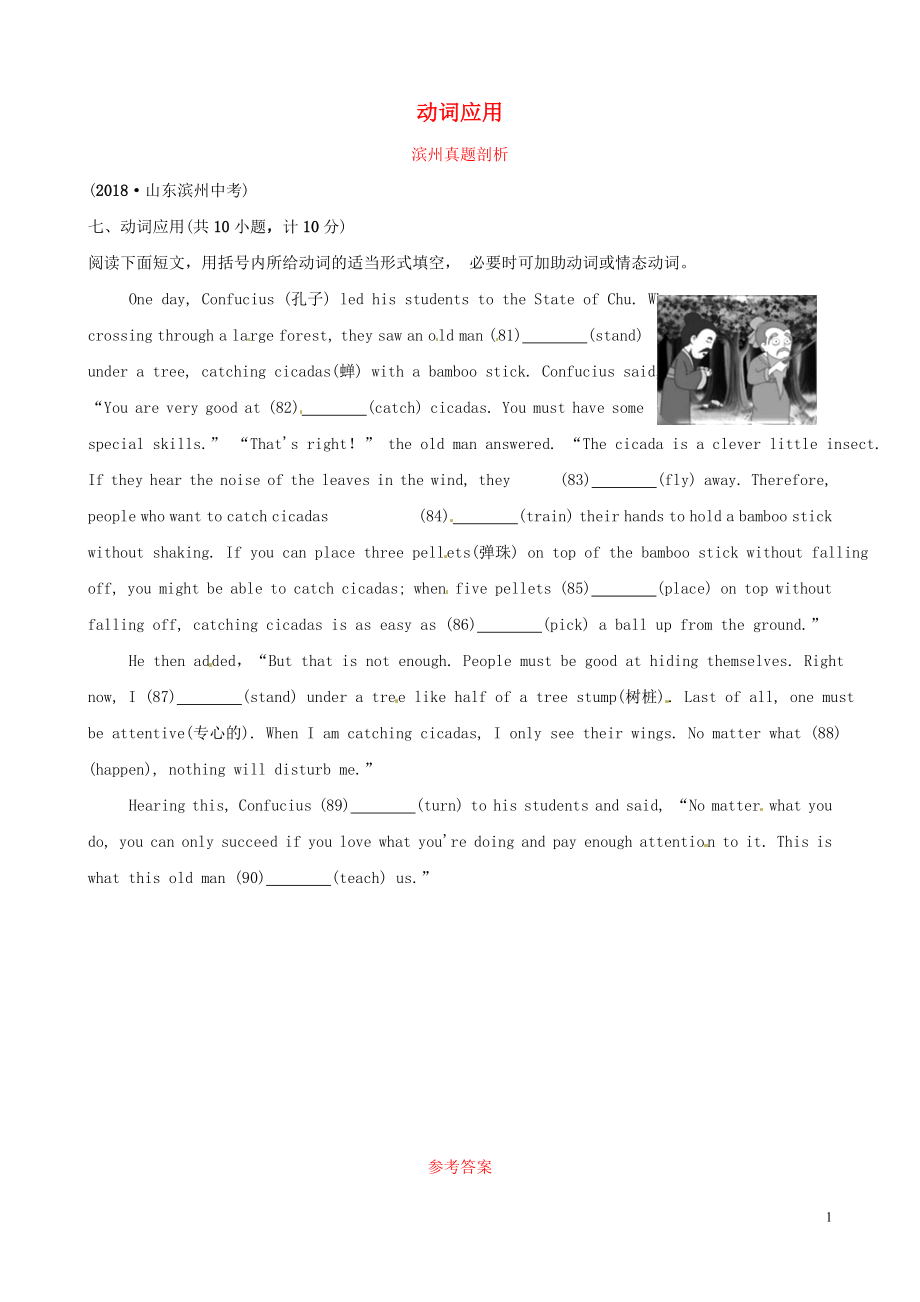《山東省濱州市2019年中考英語題型專項(xiàng)復(fù)習(xí) 題型七 動詞應(yīng)用真題剖析》由會員分享�,可在線閱讀,更多相關(guān)《山東省濱州市2019年中考英語題型專項(xiàng)復(fù)習(xí) 題型七 動詞應(yīng)用真題剖析(2頁珍藏版)》請?jiān)谘b配圖網(wǎng)上搜索�����。
1���、動詞應(yīng)用
濱州真題剖析
(2018·山東濱州中考)
七���、動詞應(yīng)用(共10小題,計(jì)10分)
閱讀下面短文����,用括號內(nèi)所給動詞的適當(dāng)形式填空, 必要時(shí)可加助動詞或情態(tài)動詞�����。
One day, Confucius (孔子) led his students to the State of Chu. When crossing through a large forest, they saw an old man (81) (stand) under a tree, catching cicadas(蟬) with a bamboo stick. Confucius said,
2、“You are very good at (82) (catch) cicadas. You must have some special skills.” “That's right�����!” the old man answered. “The cicada is a clever little insect. If they hear the noise of the leaves in the wind, they (83) (fly) away. Therefore, people who want to catch cicadas
3��、 (84) (train) their hands to hold a bamboo stick without shaking. If you can place three pellets(彈珠) on top of the bamboo stick without falling off, you might be able to catch cicadas; when five pellets (85) (place) on top without falling off, catching cicadas is as easy as (86)
4�����、 (pick) a ball up from the ground.”
He then added����,“But that is not enough. People must be good at hiding themselves. Right now, I (87) (stand) under a tree like half of a tree stump(樹樁). Last of all, one must be attentive(專心的). When I am catching cicadas, I only see their wings. No matter w
5���、hat (88) (happen), nothing will disturb me.”
Hearing this, Confucius (89) (turn) to his students and said, “No matter what you do, you can only succeed if you love what you're doing and pay enough attention to it. This is what this old man (90) (teach) us.”
參考答案
6��、
【參考答案及解析】
81.standing see sb. doing sth.意為“看到某人正在做某事” , 結(jié)合語境可知����,孔子看到一個(gè)老人正站在樹下捕蟬�。
82.catching be good at doing sth.意為“擅長做某事”,at為介詞,故填動名詞形式����。
83.will fly if引導(dǎo)的條件狀語從句,從句是一般現(xiàn)在時(shí)�,主句要用一般將來時(shí),故填will fly�。
84.must train 結(jié)合前文可知,蟬聽覺靈敏���,因此想捉住蟬的人必須訓(xùn)練他們的手握住竹竿不顫抖���,才能捕到蟬。故用情態(tài)動詞must加動詞原形����。
85.a(chǎn)re placed 句子的主語pellets和
7、謂語動詞place之間為被動關(guān)系���,聯(lián)系上下文可知���,本句用一般現(xiàn)在時(shí),主語是five pellets�����,故用are placed。
86.picking as...as...意為“和……一樣……”�,as為介詞,故用動名詞形式��。句意:捕蟬就像從地上撿球一樣容易�����。
87.a(chǎn)m standing 由時(shí)間狀語Right now可知��,此處用現(xiàn)在進(jìn)行時(shí)�,主語為I�,所以be動詞用am。
88.happens 句意:無論發(fā)生什么事����,沒什么事情將會打擾我。主句用的一般將來時(shí)����,故從句用一般現(xiàn)在時(shí),故填 happens����。
89.turned 由后面的 “and said” 可知用一般過去時(shí)����,故填turned����。
90.has taught 結(jié)合語境可知此處強(qiáng)調(diào)對現(xiàn)在造成的影響,故用現(xiàn)在完成時(shí)�。句意:這就是這位老人已經(jīng)教給我們的。故填has taught�����。
2
 山東省濱州市2019年中考英語題型專項(xiàng)復(fù)習(xí) 題型七 動詞應(yīng)用真題剖析
山東省濱州市2019年中考英語題型專項(xiàng)復(fù)習(xí) 題型七 動詞應(yīng)用真題剖析

